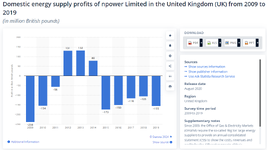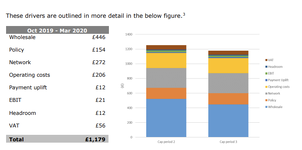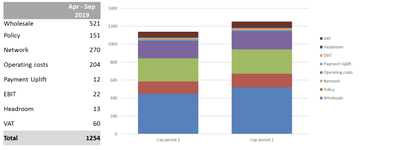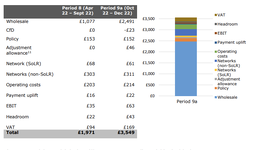I'm assuming you only asked that as you know they declared a loss :LOL:
They will use that loss to get a tax break from the following years profits, and also they're obviously gaining a boat load of assets, and paying off loads of debt each year (so the loss isn't really a loss).
EDF are a producer as well as a supplier of course, and they're also French government owned, so there will be all sorts of weird things going on there, but every one of the big 6 were basically charging the same rates I think, and I think most of the other big 6 were still in profit?
EDF are also funding Hinkley Point C which will be hammering them, but I wouldn't worry too much about them, as their supply price and index linking will just ensure they make more than they otherwise would have in the long run, good investment by them, fair play.
The company is worth a trillion mind, they're not struggling.
Yes but we arent on about producers here, thats a seperate business. I know they made a massive loss both years. I asked that because you mentioned them specifically - not all energy suppliers have the benefit of a multi billion pound government backed conglomerate behind them to help them cushion £500m-1bn+ losses.
Npower had plenty of generation also but that was in the innogy side of the business. the supply business was consistently loss making. They had a merger with SSE planned for npower, but the introduction of the price cap frankly made npower a non-viable business and they took a 1.5bn euro writedown on its value. It eventually got merged with e.on but they just wanted the customers and shuttered majority of the rest of the business. SSE themselves ended up selling their retail business to OVO for the same reasons - OVO and Octopus of course probably a lot more agile than the big six were to allow them to pivot faster. OVO swung from a £300m profit prior to the crisis to a £1.5bn loss, and at one point OfGem was going to propose nationalisation and OVO registered with co house they were no longer a viable going concern, but luckily they avoided all that. Getting a tax break on next years profits only helps if you make a profit the next year of course. It doesn't stop you going completely bankrupt if you run out of cash.

The ones that made profits over that time for the large part certainly weren't doing so from unit rates, british gas has often relied on its famously overpriced boiler installation and servicing arm. Consider that the graph above only runs to 2019 which is when the price cap came in so thats how they were strugglign when they were all already able to charge stupid rates to their SVR book which typically ran at ~50% of customer base. npower of course closed the following year after being absorbed by e.on. Octopus has never made an annual profit and recorded its first quarterly profit recently, albeit a small one. again, they definitely dont profit on supply - they profit from data and software - selling their kraken platform globally. It's not as simple as looking at the headline unit rate is X so they made Y profit, as most of these firms are massive and therefore need thousands of staff from call centres to metering operatives, smart metering program was massive but government mandated so they had to do it, bad debt is a huge cost and they had increasing regulation (and rightfully so) around how they chased that such as forcefits, vulnerable customer groups get larger and they need special treatment. £40 profit isn't a massive amount but if you have 6 million customers that's a decent number. Anything beyond that is from additional services, getting lucky with hedging or cost reduction. It's a heavily regulated business like banking is, with auditors, both internal and external, constantly reviewing things. If you are found to have charged a customer for something that isn't pure cost it creates a large issue. I remember we used to charge a fee for copy bills being posted out to cover the time and materials but if you ordered say 10 at £2 each it added up - it ended up we had to produce a formula that calculated the latest costs to within a few pence but it got to the point that it would need reviewing and changing for inflation and the like that it was cheaper to just make them free to send than to change them anytime a variable changed.
When I worked on the smart metering rollout I came in quite late on around 2016 but even then they had about 300 IBM and Cognizant contractors as well as hundreds of permanent staff from BA's, PM's, SA's, Testers, metering ops, data analysts etc, the cost was ridiculous but it had to be done and none of it was free. You cant just stuff profit into other costs and expect no-one to notice, because they would.
as for seeing earlier figures like you mentioned, this is at a higher level but back then £20 profit per account was seen as good - you would pay an introducing firm several hundred pounds for a new customer gain, with a view to hopefully retaining them long enough to become a profit. EBIT is the relevant profit element


Compare this to the below where they were allowed to claw back some of the massive costs they had suffered, but its still not hundreds/thousands per customer.





